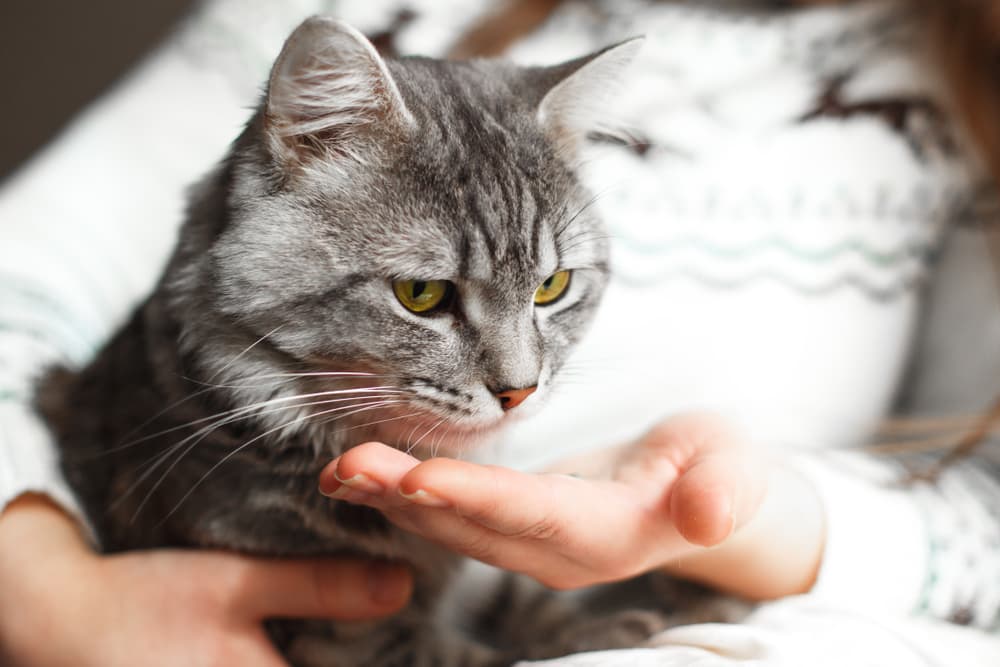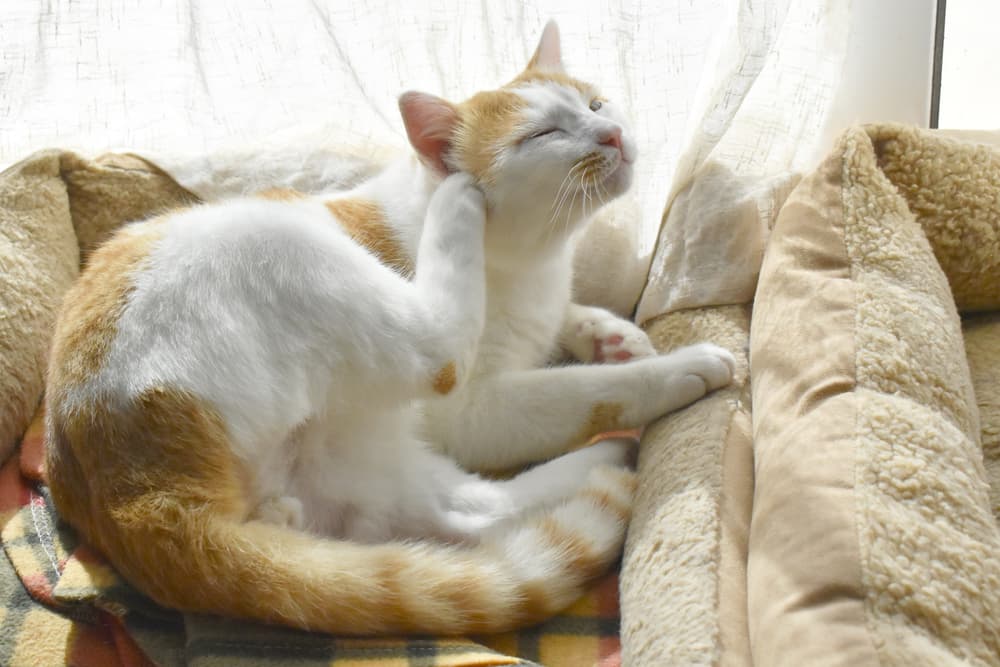Benadryl for Cats

Medication details
- Medication type: Antihistamine, Anti-nausea
- Form: Liquid, Capsule, Tablet, Injection
- Prescription required? No
- Brand names: Benadryl, Diphenhist, ZzzQuil, Vetadryl
- Common names: Diphenhydramine; Often labeled as Allergy Relief or Sleep Aid under various store names
- Available dosages: Liquid: 12.5 mg/5 mL (2.5 mg/mL); Capsules: 25 mg, 50 mg; Veterinary Tablets: 10 mg, 30 mg; Human Tablets: 25 mg, 50 mg; Injection: 50 mg/mL
Benadryl has been in existence for nearly eight decades now and is a common allergy medication for humans. But Benadryl for cats is also useful in a couple important instances. This medication is also available in many forms over the counter and is very cost effective.
However, many cat health conditions and a few medications may make it unsafe for pet parents to give this medication to their cat. You should always confirm with your veterinarian before giving your cat Benadryl.
Read below for more information, including dosing and administration tips.
What is Benadryl?
Benadryl is a brand name for the generic medication diphenhydramine. It was accidentally discovered as an antihistamine in the 1940’s by a chemist. Antihistamines are medications that block histamine. By doing so, antihistamines decrease allergy symptoms.
The FDA approved Benadryl for human use in 1946, and to this day it is a well-known medication used in both human as well as animal patients (including dogs and cats). It has been available in various generic forms since the 1960’s and is widely available across the United States.
Benadryl and all the generic forms can be found over the counter in a variety of stores. Many veterinarians carry this medication for their patients or recommend pet parents purchase it at a local store or pharmacy.
Benadryl is in many products that are not marketed just for antihistamine properties. A strong side effect in humans is sleepiness, so many companies market Benadryl as a “sleep aid” to help people fall asleep. Benadryl may also be in a combination of medications for sinus pain relief, often included with a non-steroidal anti-inflammatory (NSAIDs) such as acetaminophen and pseudoephedrine, a nasal decongestant.
Can You Give Cats Benadryl?

Yes, Benadryl can be used in cats. However, a veterinarian should be consulted since many cat health conditions may become worse in combination with this drug. In addition, if not dosed correctly, side effects can be intense.
If your cat has the following health concerns, giving Benadryl could be harmful:
- Chronic bronchitis or “asthma”
- Liver disease
- History of seizures
- Glaucoma (increased pressure in the eye)
- Hyperthyroidism (producing too much thyroid hormone)
- Urinary retention (not able to fully empty the bladder)
- Intestinal atony (slow movement through the guts including megacolon)
- Heart disease
- High blood pressure (hypertension)
Benadryl enters the milk and goes to kittens, so if your cat is lactating (i.e. feeding kittens), veterinary advice is necessary before giving this medication. Benadryl has not been studied in pregnant cats, so ask a veterinarian if you believe your cat is pregnant.
There are two sizes of tablets made specifically for dogs and cats. However, the human form is safe, too, as long as it is dosed appropriately and doesn’t contain other medications. It is also important to purchase tablets or liquid if using human formulations, since the capsules will almost certainly be too high of a dose for a cat.
What Is Benadryl Used for in Cats?
Benadryl is primarily prescribed for skin conditions. Antihistamines help to decrease symptoms such as itchiness in the skin by preventing allergies to the environment, such as allergies to pollen. However, Benadryl is rarely effective as the only treatment for moderate to severe allergies. Benadryl is also used to prevent allergic reactions to vaccines, blood transfusions, and chemotherapy (i.e. drugs used against cancer).
Benadryl also has anti-nausea properties, meaning it may decrease nausea and vomiting. Benadryl is specifically prescribed to help with motion sickness in cats that may happen from car rides. A common side effect of Benadryl for cats is drowsiness, so some veterinarians may recommend a dose to calm your cat down prior to something stressful like a veterinary visit.
In summary, Benadryl can help cats with:
- Allergies
- Pruritus (skin itchiness)
- Miliary dermatitis (skin condition in cats likely due to allergies)
- Prevention of allergic reactions to vaccines, blood transfusions and specific medications
- Motion sickness
- Mild sedative
Benadryl for Cat Travel
Using Benadryl during travel with your cat is a safe way to decrease motion sickness, which can cause some cats to vomit. It also makes cats a little sleepy, which can help decrease some other symptoms that make travel harder like vocalizing.
However, Benadryl does not decrease cat anxiety and is unlikely to be helpful in cats who are very stressed or anxious.
How to Give Benadryl to Cats

Liquid medications are often the easiest in cats, but only human formulations of liquid Benadryl are available, and they are flavored to be sweet. While cats cannot taste sweet very well, the fruity flavors of Benadryl are often not appreciated by cats!
Tablets are another way of providing Benadryl in safe dosages to your cat. Pet parents can crush the tablet into a couple tablespoons of canned cat food and let their cat eat it. Use a very small amount of food so your cat eats all the food and the whole dose in a short amount of time.
In a pinch, if your cat won’t eat the medication in food, crush the medication into a small amount of tasty liquid like tuna juice or low-sodium chicken broth. If your cat doesn’t drink it, use a syringe to get your cat to swallow it.
Benadryl for Cats: Side Effects
Benadryl has mild side effects, unless your cat receives a dose that is high or she has other chronic medical conditions. The most common side effect is drowsiness and occurs in most cats.
Some of the side effects for cats, however, can be serious. If an overdose is suspected, cats could develop issues like seizures, coma, and death. However, the dose needed for this would be very high and is extremely rare.
Possible side effects of Benadryl for cats include:
- Drowsiness
- Ataxia, or walking drunkenly
- Agitation
- Seizures
- Behavior changes like vocalizing, affectionate behavior
- Gastrointestinal effects like decreased appetite, nausea, vomiting, constipation, or diarrhea
- Decreased frequency of urination
Reactions with Other Drugs and Medications
Benadryl can react with other cat medications including:
- Other antihistamines like amitriptyline, chlorpheniramine
- Alprazolam
- Amitraz
- Diazepam
- Methionine
- Phenobarbital
- Prochlorperazine
- Selegiline
Reactions typically result in an increase in side effects of either Benadryl or the other medication. Benadryl should not be given to cats just before or after anesthesia, since certain medications that may be used during anesthesia interact with Benadryl.
Benadryl Dosage for Cats

Benadryl is dosed for cats based on weight and must be given at least every 12 hours, but preferably every 8 hours, to be effective.
Before giving this medication, pet parents must follow-up with their veterinarian first to avoid serious side effects.
The typical dose for cats is 1 mg per pound of body weight. One-quarter of the 25 mg tablet is prescribed for most cats 2 to 3 times per day, but a half tablet may be necessary if your veterinarian advises it.
This dosing would be too much for kittens and very small cats. For liquid, each pound of your cat’s weight would equal a dose of approximately 0.4 mL. An 8-pound cat would need to drink over 3 mL of this stuff – which can be very challenging to administer.
Before giving your cat Benadryl, make sure to review with your veterinarian the exact product you plan on giving. Many products are made with other medications like acetaminophen or pseudoephedrine which are toxic to cats.
Cost of Benadryl for Cats
Generic forms of diphenhydramine tend to cost less than name-brand Benadryl medication. Each tablet costs approximately 4 cents, so for most pet parents they will only pay 2 cents per day to give this medication in tablet form. Giving an 8-pound cat liquid will cost approximately 20 cents per day.
Benadryl Storage Instructions
All forms of Benadryl should be stored at room temperature (68-77 degrees). For tablets and capsules, avoid high humidity. The injectable form needs to be protected from exposure to light.









